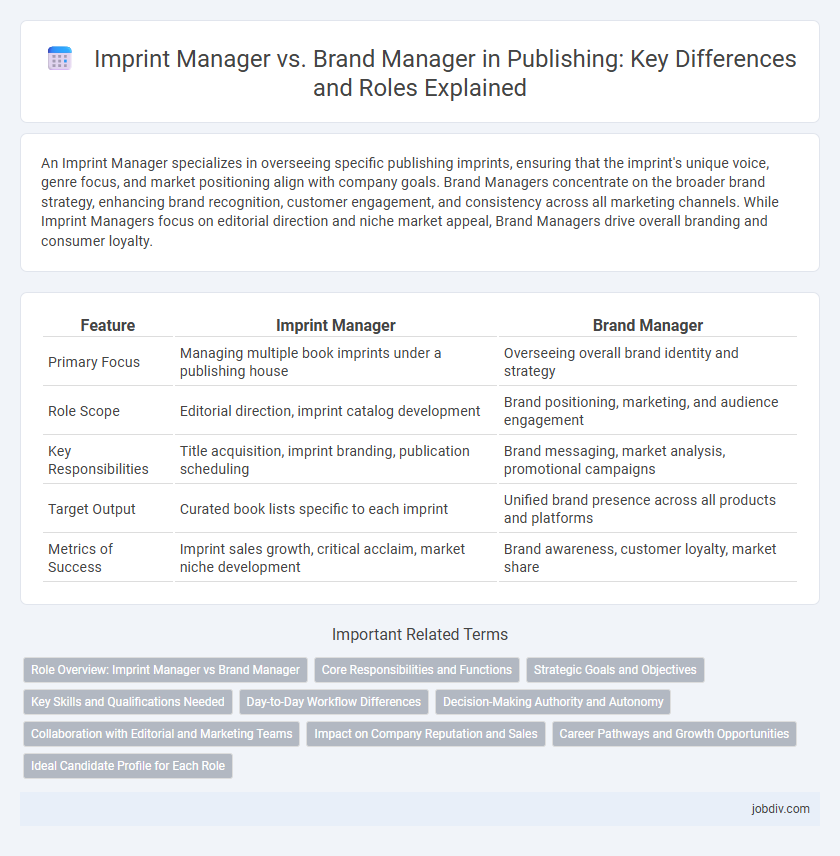An Imprint Manager specializes in overseeing specific publishing imprints, ensuring that the imprint's unique voice, genre focus, and market positioning align with company goals. Brand Managers concentrate on the broader brand strategy, enhancing brand recognition, customer engagement, and consistency across all marketing channels. While Imprint Managers focus on editorial direction and niche market appeal, Brand Managers drive overall branding and consumer loyalty.
Table of Comparison
| Feature | Imprint Manager | Brand Manager |
|---|---|---|
| Primary Focus | Managing multiple book imprints under a publishing house | Overseeing overall brand identity and strategy |
| Role Scope | Editorial direction, imprint catalog development | Brand positioning, marketing, and audience engagement |
| Key Responsibilities | Title acquisition, imprint branding, publication scheduling | Brand messaging, market analysis, promotional campaigns |
| Target Output | Curated book lists specific to each imprint | Unified brand presence across all products and platforms |
| Metrics of Success | Imprint sales growth, critical acclaim, market niche development | Brand awareness, customer loyalty, market share |
Role Overview: Imprint Manager vs Brand Manager
An Imprint Manager oversees the development, production, and marketing strategies of a specific publishing imprint, ensuring content aligns with the imprint's identity and target audience. A Brand Manager focuses on building and maintaining the overall brand image, enhancing brand equity, and driving engagement across multiple imprints or publishing lines. While the Imprint Manager is content-centric, the Brand Manager prioritizes brand positioning and market presence.
Core Responsibilities and Functions
Imprint Managers oversee the development, editorial direction, and market positioning of specific publishing imprints, ensuring consistent brand identity and aligning content with target audiences. Brand Managers focus on broader brand strategy, consumer engagement, and marketing initiatives to enhance overall brand equity and visibility across multiple platforms. Both roles require collaboration with editorial, marketing, and sales teams to optimize revenue and audience reach in competitive publishing markets.
Strategic Goals and Objectives
Imprint Managers concentrate on developing and maintaining distinct publishing lines, ensuring each imprint's strategic goals align with niche market demands and long-term brand identity. Brand Managers focus on broader market positioning, overseeing brand equity growth, customer loyalty, and cross-channel consistency to maximize overall corporate value. Both roles aim to optimize market reach and profitability through targeted audience engagement and strategic product differentiation.
Key Skills and Qualifications Needed
Imprint Managers require strong knowledge of publishing operations, project management skills, and expertise in content curation to maintain distinctive literary identities. Brand Managers need proficiency in marketing strategies, brand positioning, and data analysis to enhance visibility and audience engagement. Both roles demand excellent communication abilities and a deep understanding of the publishing industry's market trends.
Day-to-Day Workflow Differences
Imprint Managers primarily oversee the editorial selection, production schedules, and rights management within specific publishing imprints, ensuring content aligns with targeted market segments. Brand Managers focus on developing brand identity, marketing strategies, and audience engagement across multiple titles to enhance visibility and sales performance. The day-to-day workflow of Imprint Managers is centered on content curation and operational logistics, while Brand Managers concentrate on market research, promotional campaigns, and cross-platform brand consistency.
Decision-Making Authority and Autonomy
Imprint Managers typically hold greater decision-making authority over editorial direction, financial investments, and marketing strategies within their specific publishing lines, allowing them substantial autonomy to shape imprint identity. Brand Managers generally focus on maintaining brand consistency and market positioning, operating under strategic guidelines set by higher management and exercising limited autonomy in tactical decisions. The imprint role demands broader control over business operations, whereas brand management emphasizes specialized influence to support overall corporate objectives.
Collaboration with Editorial and Marketing Teams
Imprint Managers coordinate closely with editorial teams to ensure publishing consistency and maintain the unique identity of each imprint, while collaborating with marketing departments to tailor promotional strategies that align with the imprint's target audience. Brand Managers focus on developing and executing comprehensive branding campaigns by integrating feedback from both editorial and marketing teams to strengthen brand recognition and engagement across multiple channels. Effective collaboration between these managers and their respective teams enhances content quality, marketing precision, and overall market positioning within the publishing industry.
Impact on Company Reputation and Sales
Imprint Managers shape company reputation by overseeing specific publishing lines, ensuring consistent quality and targeted audience engagement that drives niche market sales. Brand Managers influence broader market perception by managing overall brand identity and marketing strategies, directly boosting sales through enhanced brand loyalty and recognition. Both roles synergize to strengthen company reputation and maximize revenue streams in the publishing industry.
Career Pathways and Growth Opportunities
Imprint Managers specialize in overseeing specific publishing imprints, focusing on niche market segments and editorial direction, which offers pathways into senior editorial roles or specialized content leadership. Brand Managers concentrate on building and managing publisher brand identity and marketing strategies, with growth opportunities in digital marketing, product development, and executive brand leadership. Both roles provide essential experience for advancing into broader publishing management and strategic decision-making positions.
Ideal Candidate Profile for Each Role
An Imprint Manager in publishing excels in overseeing specific publishing lines, requiring strong project management skills, deep editorial knowledge, and experience with market trends to ensure each imprint's distinct identity and profitability. A Brand Manager focuses on building and maintaining the publisher's overall brand presence, necessitating expertise in marketing strategy, consumer insights, and digital engagement to drive brand loyalty and market expansion. Ideal candidates for Imprint Manager roles possess editorial background and leadership in niche markets, while Brand Managers typically have skills in brand positioning, campaign execution, and cross-channel communication.
Imprint Manager vs Brand Manager Infographic

 jobdiv.com
jobdiv.com